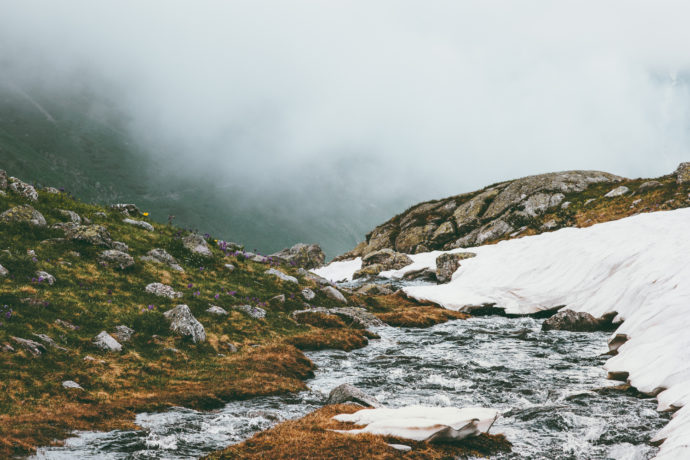I love the narrative that takes place in Genesis 1 and 2. It first came alive to me in a brilliant way when I was at an Ignite Conference workshop years ago. The workshop was on Bible Storying. The presenter had us close our eyes and let our imaginations work while he slowly read a short narrative that combined elements of Genesis 1 and 2. Suddenly, the creation story was three-dimensional. I could almost feel the breeze as God walked with Adam and Eve in the cool of the evening. It blew me away (no pun intended). It’s the story of a loving God who created order out of chaos.
This God set celestial bodies and ocean tides and seed-filled plants into place. Then God filled the earth with all kinds of birds and land animals and sea creatures. The entire system of sun and rain, land and sea, plants and animals, worked symbiotically to continue to grow and regenerate and produce new life season after season. God spent five days working out each detail. There’s no doubt that every bit of creation matters to God. It was all good.
Then God set to work on the greatest masterpiece of all. Humanity. Out of the earth itself, God formed man and woman in the very image of God. With Adam and Eve, God had a unique relationship, and God gave them a special role: to care for the creation God had created. God set the humans in the garden to work it and take care of it, to eat of its fruit, to give names to the creatures they encountered, and to savor its beauty (Gen. 1:27–30; 2:15). It was very good.
Then God set to work on the greatest masterpiece of all. Humanity. Out of the earth itself, God formed man and woman in the very image of God.
From the very beginning, the man and the woman were given a purpose unlike any other: to partner with God in the creative work of taming and nurturing life on earth so that it might fully become all that God intended. As the seasons changed, they would get to till the perfectly moist earth so the newly fallen seeds might take root and germinate. They would have the privilege of thinning out areas where the growth became too thick. They would have the opportunity to harvest the fruits in season, encouraging even more prolific production the next year. They would get to celebrate the birth of new baby animals with coos of excitement and sweet licks from furry little bundles. Ahhh . . . to partner with God in God’s creative work. To stand in awe season after season as creation becomes a little more as God intended. To know that we are privileged to have a role in that work. To think, We were made for this! To live like creation matters. How sweet would it be?
The reality is that things have never been the same since Adam and Eve were cast from the garden. Working the earth has been hard. Growing food has been difficult. Thorns and thistles grow readily, swarms of insects devour entire fields ripe for harvest, and the weather can turn from friend to enemy in the blink of an eye. Just as God said it would in Genesis 3, the work that was once intended to be easy and delightful has become painful toil. But harder work isn’t our only problem. We’ve forgotten a critical piece: our mission and purpose in the first place. No longer do we as God’s people see creation care as an important part of our role, critical even to the very core of our existence. Instead we use and abuse creation for our own selfish gain, destroying the very handiwork of God without a second thought. We’ve completely forgotten that creation matters and that we have an essential role in caring for it. Along with our relationship with God, our relationship with creation was broken as well.
As Westerners in particular, we consume massive amounts of goods without a thought as to where they came from, what was destroyed in the process, and what it took to get them to our door in an Amazon box overnight. We don’t bat an eye at the amount of waste that those goods or the packaging they came in represent. Every week, trash trucks dutifully haul off our bags and bags of waste to unseen locations while we continue to consume more.
Included in all that waste are tons and tons of food. According to the USDA, 30 to 40 percent of food purchased in the United States ends up as waste. In 2010, 133 billion pounds of food at a value of $161 billion was wasted in the U.S. alone. That food took resources to grow. Valuable soil nutrients nurtured the production of those fruits and vegetables and provided food for the livestock that ends up in our refrigerators. All the food waste that ends up in landfills produces dangerous methane gases. Meanwhile, the unseen places that hold our rubbish are real places and real homes to real, living creatures. Piles of unwanted clothes dumped from donation bins create burdensome mountains for developing countries. Plastic—every toothbrush, plastic straw, and milk carton ever created, which still exists on the earth in some form or another—has to go somewhere. It slips into our waterways and fills our oceans, choking sea creatures and contaminating our food. Water sources of innocent workers are contaminated by the factories and the processes that are used to make our stuff, causing birth defects, tumors, and astounding death rates.
What’s worse is not only do we fail to live into our identity as caretakers of creation, but we prevent other creatures from their purposes as well. We keep cows from grazing and pigs from rooting and chickens from ever seeing the light of day, all in the name of mass food production (see Joel Salatin’s The Marvelous Pigness of Pigs: Respecting and Caring for All God’s Creation). We prevent spiders from catching bugs and beavers from building dams because we fail to value the importance of their roles in creation.
It’s easy to feel helpless when it comes to creation care. But we are not. We are a people of hope.
It’s easy to feel helpless when it comes to creation care. But we are not. We are a people of hope. We are a people who believe in the already/not-yet kingdom of God. That means we get to be a part of bringing about God’s kingdom now. We aren’t just idly waiting to be whisked away on a white cloud. Just as Adam and Eve were placed in the garden, we have been commissioned with the important work of caring for creation. We are privileged to be part of restoring God’s creation today. Whether we live in the city, in suburbia, or on a farm, there are practical things each of us can do to participate in the restorative work of God in the world.
Consider these ways that you can declare that creation matters in your daily life:
1. Buy less. I love this tip. It’s easy. It doesn’t cost a dime. In fact, it saves money. Take a few minutes to think before your next Target run to ask: Are these things I need? Do they add significant value to my life? Is the waste they create and the environmental impact of their production worth it? Can I live without it? Buying less stuff means there’s less stuff to store, organize, or discard in our homes. Less stuff = less consumption = less waste. Plus, it means more money for other purposes!
2. Buy what you will eat and nothing more. Finish off those leftovers and use those fruits that are “on the verge” in a smoothie or in baking. Put a compost bin in your back yard and fill it with all the parts you cut off your fruits and veggies. This is great for the environment and for your flowerbed when spring rolls around. Composting can reduce your household waste by up to 50 percent.
3. Use reusable grocery and produce bags. They’re inexpensive and readily available. Admittedly, it takes a while to develop the habit of remembering, but it’s a relatively simple step that makes a big difference. Plus, sturdy, drawstring produce bags are so much more enjoyable to use than those terribly flimsy plastic bags at the store.
4. Skip the plastic straw and the disposable cup too. Even better, skip the plastic silverware as well. Stick a reusable cup and set of cutlery in the car that you can use when you go out.
5. Eat fewer packaged foods. They are so convenient. It’s true. But they also create rubbish that often isn’t recyclable. Not to mention, they usually can’t be composted and create waste in the production process.
6. Plant a garden. We can participate in God’s restorative work in the world by nurturing plant life. Intentionally making space for plants native to our area allows caterpillars to form chrysalises and butterflies to hatch. It gives bees, which are essential to our food production, places to pollenate. It supports the carbon cycle that the earth was created to run on. And it provides fruits and vegetables for our families to enjoy.
7. Pick up trash. There’s a trend in Sweden called plogging, where you pick up rubbish as you walk or jog. Supposedly, you burn even more calories. More importantly, you’re keeping trash from getting where it shouldn’t. Give plogging a try, or take a minute to pick up litter when you see it.
8. Shop consciously. There are more and more environmentally friendly products on the market. Clothes produced in fair-trade factories and personal hygiene and cleaning products created with the environment and the health of our bodies in mind are becoming readily available. These items usually cost a little bit more, but the other tips have the potential to save enough money that you may be able to make the choice for better products one at a time—because creation matters.
9. Innovate, repurpose, and reuse. This is a trend we can all get on board with. I don’t consider myself a great thrift-store shopper, but when our son said he wanted a circus-themed birthday party, I immediately began planning for a ticket booth made of recycled lumber. A small, curved headboard made the perfect “tickets” sign. The bright blue and red and yellow multi-striped curtains I scored at our local Salvation Army are ideal for a table skirt and a photo booth backdrop. I couldn’t have imagined anything better had I dreamed it up myself, and I’ve never had so much fun shopping for party decorations. When we are finished with them, the ticket booth will become a toy for our playgroups, and the curtains will probably be donated back to the very shop we bought them from.
10. Source your food. Creation matters. That means creatures matter. As the caretakers of God’s creation, we have a responsibility to our food chain. Feedlot cows and battery-caged chickens are not reflective of kingdom living. We can begin to do better by making different choices at the store, searching out local farmers, and maybe even having a chicken or two of our own.
Most of all, enjoy creation! Take time to praise God for clouds and changing seasons. Pay attention to the intricacies of the spider’s web and the way succulents catch water in their thick leaves and the variety of plants in the wide-open spaces of the prairie. Explore! Get outside the confines of the shopping malls and freeways that define your town. God has orchestrated a vast and varied world that displays his creativity and ingenuity, and God wants us to enjoy it!
If we begin to think of ourselves as people who live out the kingdom of God as God intended, in part by creation care, we can begin to significantly impact the environmental issues in our world. We can also participate in one of God’s most fundamental callings on our lives. In so doing, we join in God’s restorative work in the world as we live in the anticipation of the fully realized kingdom that is to come. Creation matters. It matters to God, and it should matter to Christians. We were made for this!







3 Comments
Larry Fine
Thought provoking and convicting. Well written!
Mike Schutz
Elizabeth, Thanks for making the connection between the biblical narrative and our contemporary issues. I have passed the article on to our congregation, and hop we can continue the conversation.